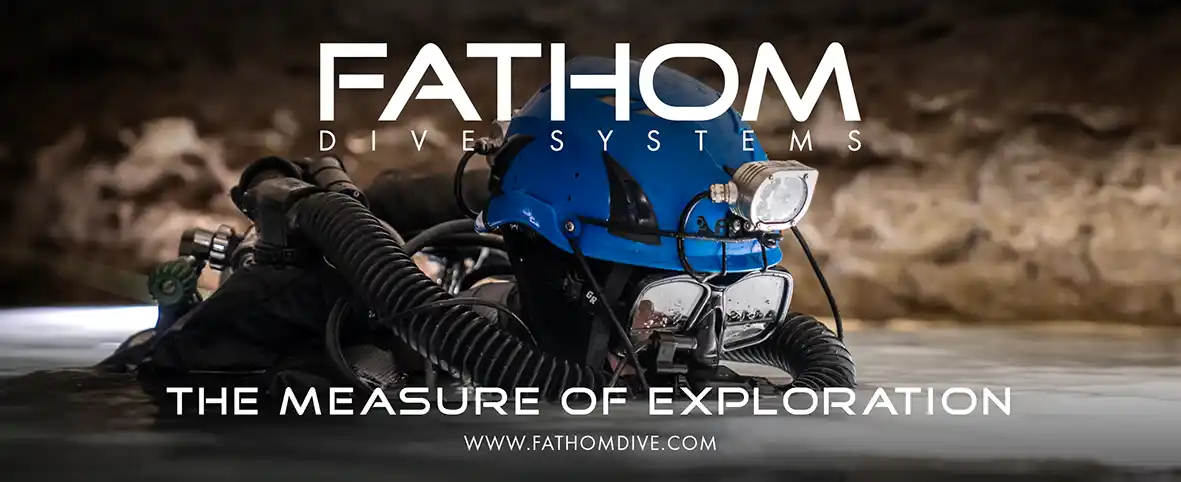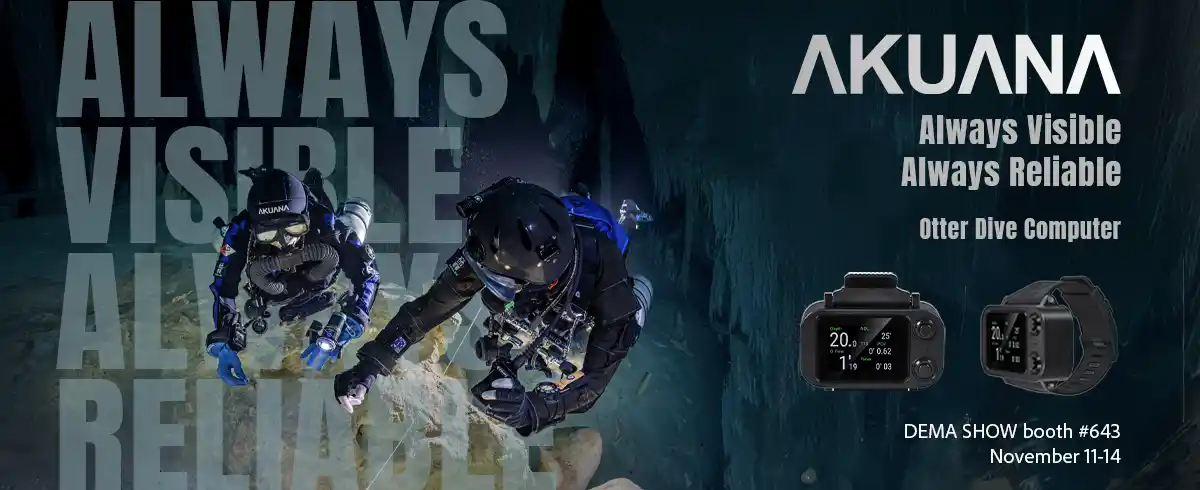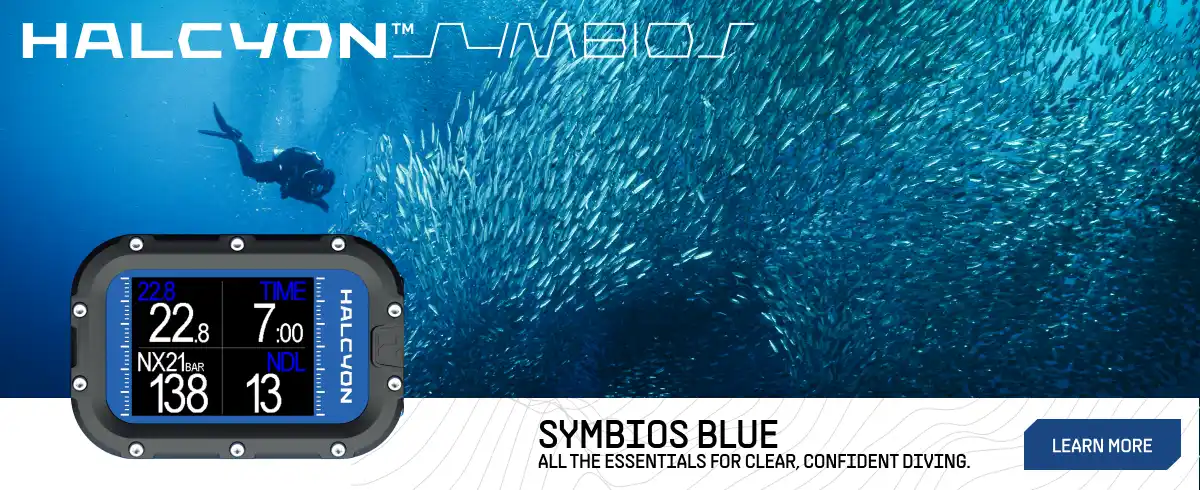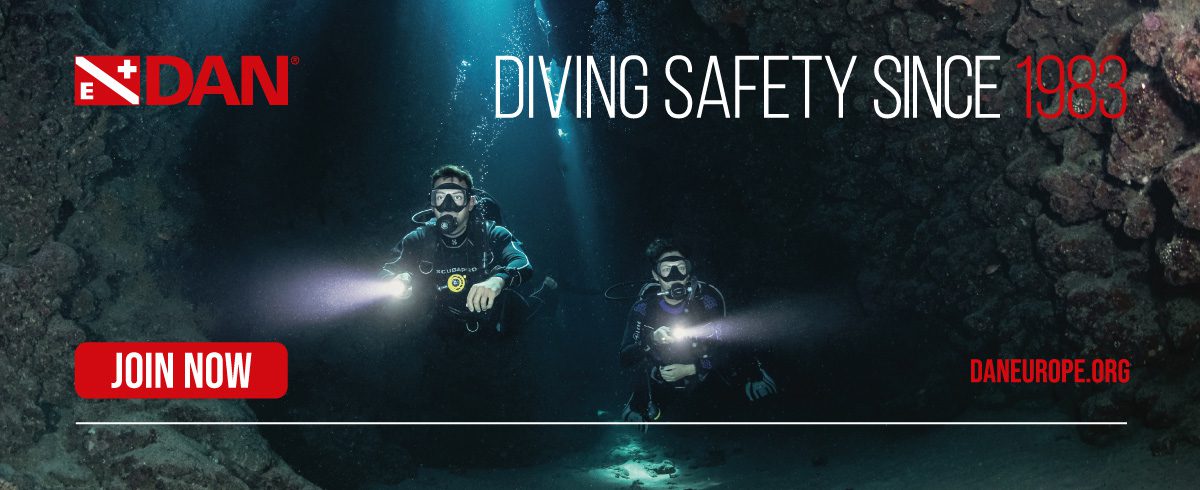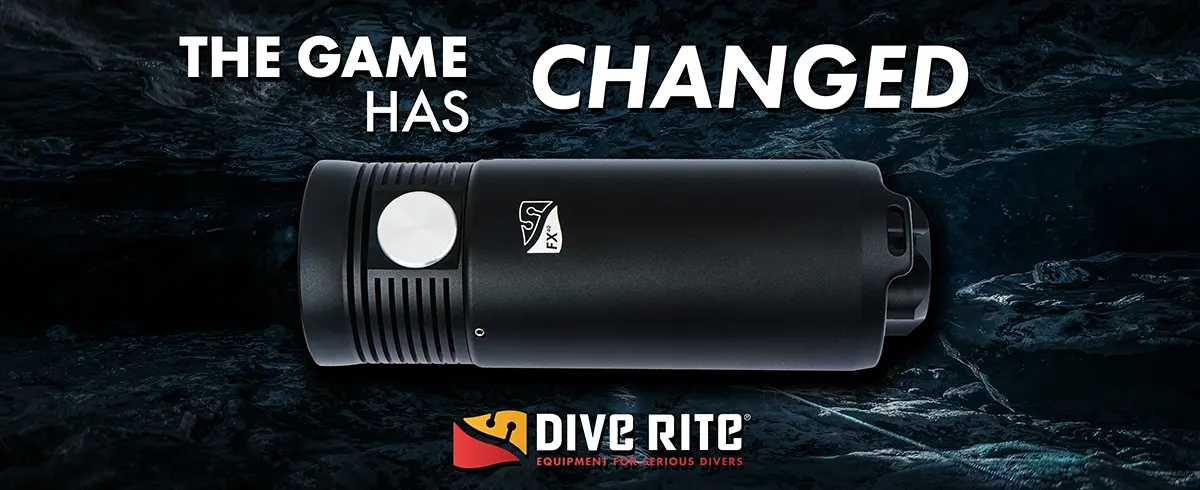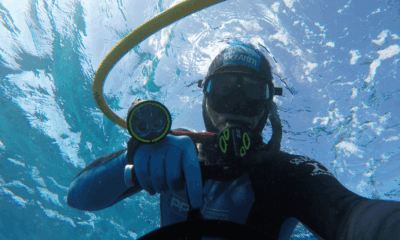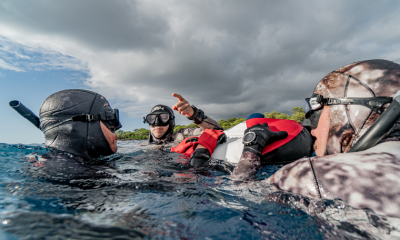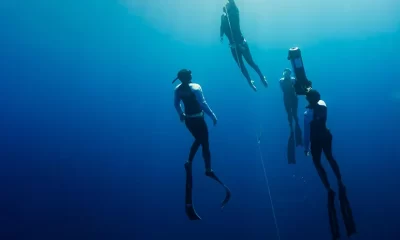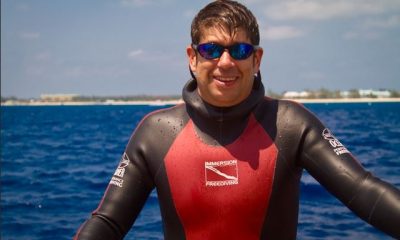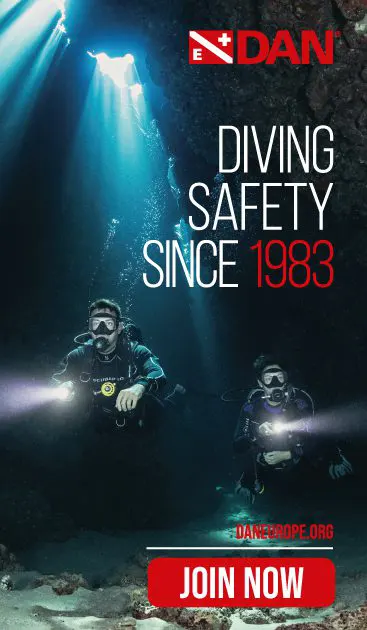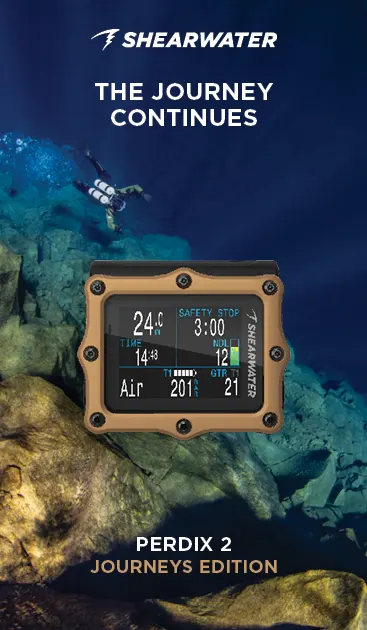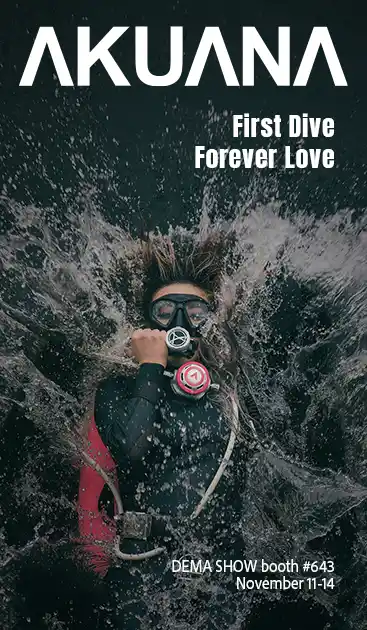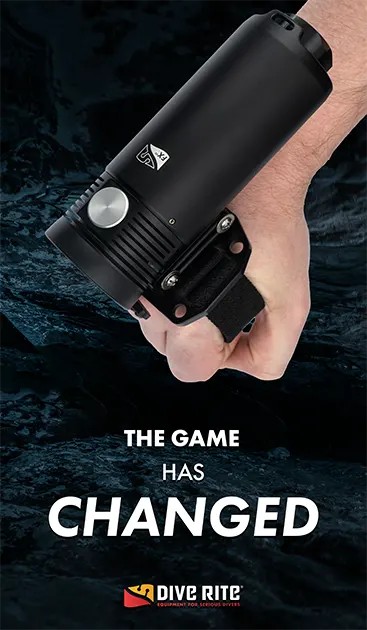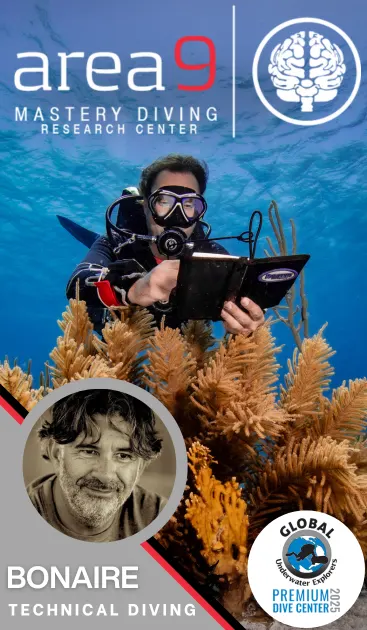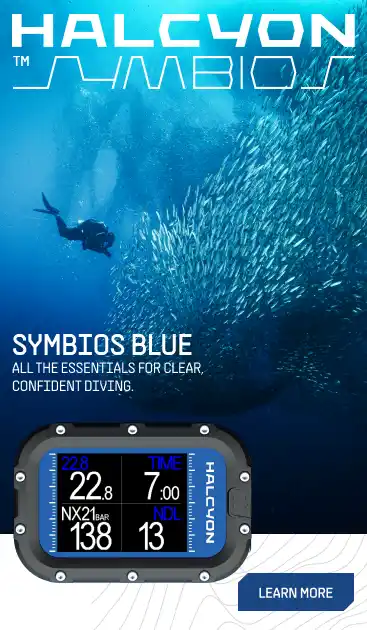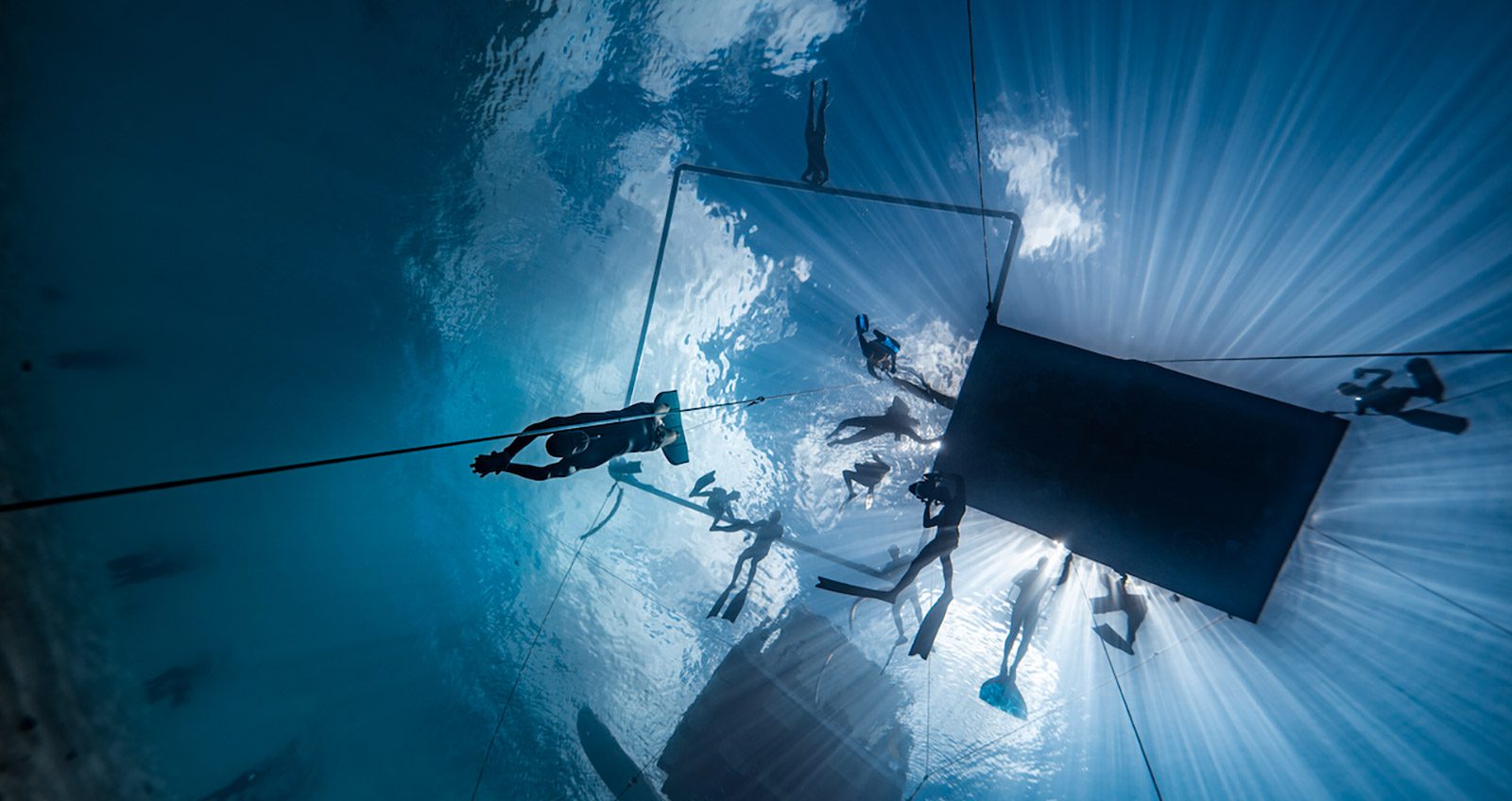
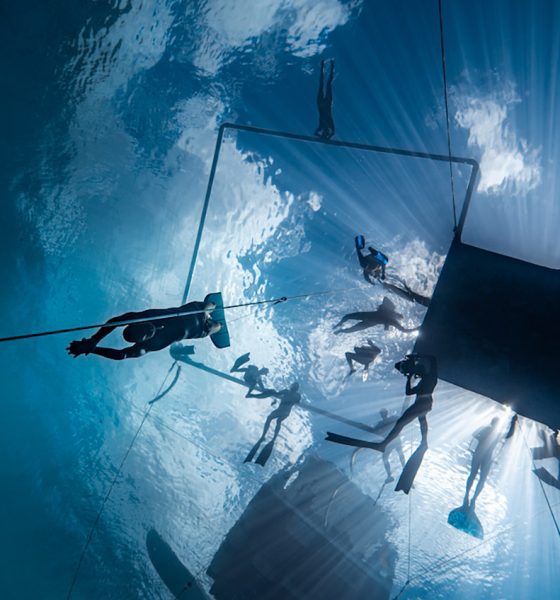
Freediving
Doping for Depth
With the breath-hold community reeling after the alleged doping scandal at this year’s Vertical Blue competition, we thought it important to understand what exactly constitutes doping in freediving, its prevalence in competition, and the potential risks to athletes. Dahab-based writer and freediver Charly Stringer consults with the experts to deliver her report. Here’s what you need to know.
Performance Enhancing Drugs in Freediving
By Charly Stringer. Lead image: looking up at the platform at Vertical Blue, Dean’s Hole, Bahamas. Photo by Daan Verhoeven
?Pre-dive Clicklist: Diamonds in the Water by Kofi Stone ?
Whenever any activity becomes a sport within a competition setting, we see the human nature response of competitiveness; a need to smash records and to become the best. Unfortunately, advancing as an athlete to the point of receiving admiration and trophies can bring out the worst in some of us. Glory and greed can take the place of honour and ethics. Some athletes decide to break the rules and potentially put their health at risk with the use of performance enhancing drugs (PEDs).
At the 2023 Vertical Blue competition, controversy hit the freediving community with public allegations of prohibited PEDs being found in the luggage of a group of Croatian athletes by William Trubridge and a security team. Investigations are still ongoing, and hearsay and gossip have spread across social media, so now is not the time for any personal opinions from me on a matter that isn’t settled.
The scandal did, however, bring my attention to the lack of information out there surrounding the use of PEDs in freediving. In a sport that is centred around pranayama, meditation, and lemon ginger teas, it seems like a huge contradiction for freediving athletes to want to put anything unnatural or harmful into their bodies. I wondered which drugs would even enhance a freediver’s performance? How would these drugs be used? And what are the repercussions of using them?
I have done a deep dive (excuse the pun) into the subject and interviewed respected names in the community to find out all I can about performance enhancing drugs in freediving.

The motivation for taking PEDs
Competitive sports can be traced as far back as 1829 BCE to the first running competitions, and the first Olympic Games started all the way back in 776 BCE. Evidently, competition is in our nature; the need to be the best and to push our limits. Freediving has been documented in various cultures throughout time as a means of finding food, but it wasn’t until the 1950s that testing freediving capabilities in a competition setting was implemented. And boy, how we have progressed since then. In 1967, US navy diver Bob Croft baffled scientists by performing a dive past 60 m/200 ft deep on breath-hold; a depth that was believed to be the absolute maximum that the human body is capable of withstanding. Now, in 2023, the record sits at over 130 m/426.5 ft deep in the constant weight discipline and we have been to 214 m/702.1 ft in No Limits. Within all this time, the freediving community has learned so much and come so far; we have mastered ultimate efficiency in equalisation and diving technique, we have developed the best safety procedures to implement in competitions, and diving past 100 m deep is no longer an exclusive club for only the very elite few (although, don’t get me wrong, it’s still pretty impressive). But, with these massive steps,more high-level athletes, all gunning for a place at the top, have arrived, and the use of PEDs has certainly become a talking point in the community. From the informal research I’ve conducted, I’ve been led to believe that testing processes are expensive and are fairly easy to cheat. That might mean that more record holders could be taking PEDs than many of us low level athletes and hobbyists realise.
Which PEDs are prohibited in freediving?
The two agencies that freediving records recognise are AIDA and CMAS. Both agencies implement a ban of the standard World Anti Doping Agency (WADA) list of prohibited substances and methods for athletes wanting to compete at their competitions. I won’t list all of the drugs, but you can view them here (prohibited list) if you’d like to. We will, however, talk about the prohibited substances which would be most relevant to freediving. I asked freediving doctor and neurosurgeon, Dr. Jani Valdivia, if he could help me to understand which PEDs might be used in freediving, and how they can enhance performance:
Beta Blockers: This family of drugs cause bradycardia (slowing of the heart rate). Dr. Valdivia explained that: “beta blockers can decrease oxygen consumption” which is obviously beneficial to freedivers. He added that there is risk involved in taking beta blockers, the main being low blood pressure. He said: “This is counter-productive in depth diving because you want to keep a normal blood pressure to avoid black outs”.
Steroids: A class of steroid hormones that resemble testosterone and simulate the growth of body tissues. Anabolic steroids are what most people think of when you mention performance-enhancing drugs. I asked Dr. Valdivia how and why anabolic steroids might be used by freedivers and he told me: “They promote faster recovery and increase muscle mass”. Although strength is not the main factor to consider when becoming a world class freediver, stronger muscles makes for easier kicking/pulling and therefore less oxygen is used by the body on a dive, this leads to longer breath-holds. Corticosteroids are a type of steroid that increases hemoglobin and red blood cell content of blood. Red blood cells are responsible for carrying oxygen around the body, so a higher red blood cell count would benefit freedivers massively when it comes to holding their breath to the point of hypoxia.
Erythropoietin (EPO)/Peptide hormones: A naturally occurring hormone that also causes the body to create more red blood cells. Endurance athletes tend to use these illegal supplements to significantly boost cardiovascular fitness. Dr. Valdivia told me that “EPO may have an advantage in freediving since red blood cells (RBC)define our oxygen carrying capacity in blood, and this is directly related to apnea performance and maintenance of brain function.” However, he thinks the availability of this medication is low to the freediving community, and perhaps the cost is prohibitive when one can maintain a normal-high RBC count and hematocrit with natural means.
Glucocorticoids: Any of a group of corticosteroids which are involved in the metabolism of carbohydrates, proteins, and fats, and have anti-inflammatory activity. Jani Valdivia informed me that glucocorticoids can have an strong anti-inflammatory and analgesic effects in the human body, thus, allowing the athlete to resume Freediving, in a shorter time after injury.
Diuretics and masking agents: Diuretics can increase the production of urine, dilute urine and enhance free water excretion. This would mean that freedivers could potentially “cheat” a urine drug test if they wanted to hide another substance in their system. The doctor told me that this is a possible way to enhance performance, however, he found an article disputing this argument by Brinkman et al.
In addition to the PEDs from the WADA prohibited list, following the Vertical Blue Scandal this year, CMAS officially added the following drugs to their own list of banned substances: Benzodiazepines and Sildenafil.
Benzodiazepines: Common examples are Xanax, Librium, Valium, Ativan, and Klonopi. These are used for muscle spasms, convulsions caused by epilepsy or fever, anxiety, agitation or insomnia associated with anxiety, panic attacks, as a pre-med before surgery or medical procedures. Known most commonly as an anti-anxiety drug.
I asked Dr. Valdivia if he could explain to me why Benzodiazepines might be used by freediving athletes. “They’re a group of sedative medications which enhance the feeling of muscle relaxation and slow down metabolism and oxygen consumption and make you more relaxed, decreasing performance anxiety, “ he said. “Reduced stress and anxiety might help you to perform better underwater, where an athlete almost wants to perform in a state of auto-pilot or cruise control without putting stress or anxiety into their performance, hence enhancing relaxation which is directly related to equalisation, which is crucial for the phase of the dive where most freedivers abort the dive, “The Freefall”.

Sildenafil: More commonly referred to as ‘Viagra’, most often used for erectile dysfunction but can also be used to treat pulmonary hypertension (high blood pressure in the lung vascular system). At this point you are probably wondering the same as I did… How on Earth can Viagra help freedivers? I posed the question to Dr. Valdivia who told me about a study by WADA where Sildenafil was studied to see if it would, “improve exercise performance at altitude,” and improve tolerance to hypoxia. The doctor explained that Viagra has been documented before as being used by athletes in other sports to enhance performance (Thompson et al) ( Busbee et al). “It can also enhance nitric oxide (NO) production in the heart. NO has been recognized as a strong scavenger of protein-derived free-radicals (Lam et al). Given that Anaerobic exercise and transient hypoxia can increase free-radical formation, it is theorized that NO production can be positive for recovery between depth freediving sessions, although there is no scientific data to make this conclusion or state this as a fact.”
He emphasised the importance of recovery time and rest days in freediving and said that: “Sildenafil might theoretically be used to reduce recovery time, but there is no clinical evidence for it to my knowledge.” However, he went on to say that in his opinion the benefits of using Sildenafil aren’t certain, “In theory Viagra stimulates nitric oxide release in your body, but the benefit for freediving is questionable because there are no clinical studies in freediving, I don’t see a huge help from Sildenafil, at least not at this time”.
I asked Valdivia if these drugs have to be used long term to see results. He said, “This depends on the substance, some substances have long term benefits (after long term use) in performance, muscle growth, recovery times etc such as anabolic steroids, but for example beta blockers and drugs such as benzodiazepines have short term effects, meaning you don’t necessarily need to be taking them for long periods of time to see the effects.”
I went on to ask if he knew how long before a drug test an athlete would have to stop taking a substance to avoid a positive test. He told me, “It depends on the elimination half-life of a substance, for example Sildenafil has a half-life of around four hours. It’s usually seven half-lives before a test for a drug may be negative as theoretically 99% of a drug is eliminated when seven half-lives have passed (Clarke & Marzinke).”

Testing athletes for PEDs in competition
So, what are the standard procedures for testing for these PEDs? I spoke to the owner and organiser of the prestigious annual Vertical Blue freediving competition, William Trubridge, to find out what protocols are in place at his competition, (which is an AIDA event):
“Typically, testing is only done when there is a successful world record attempt,” he said. But for Vertical Blue 2023, it was decided that additional doping policies and procedures would be implemented. “We provided a document that athletes had to sign when they registered for the event.” These additional policies and procedures included an agreement to off-season testing for both urine and blood, as well as gateway checks; which are baggage searches for both the athlete and anyone accompanying them upon arrival in the Bahamas.
As mentioned above, benzodiazepines are not currently on the WADA list of prohibited substances, and were only added to the CMAS specific list of banned substances after the 2023 Vertical Blue competition. They are not currently banned by AIDA as standard, however event organisers can ban the substance from their competition specifically, if they choose to. This is what Trubridge decided to do. “We had provisional testing for this substance,” he told me.
I asked Trubridge how it is decided who will be tested for drugs or have their bags searched; in other words, is it completely random? He told me, “In any anti-doping campaign there is always profiling. There are often national commissions that run anti-doping campaigns within the sports that they govern, and they are always using all kinds of intelligence about the athletes in order to determine which ones to test or not.”
But why not test everyone? Surely this would be the easiest way to ensure fair play and to not single out individuals. I put this question to Trubridge who told me that, “Using random testing isn’t as efficient in anti-doping as using profiling.”
He also added that drug testing is extremely expensive: “For urine analysis tests it costs us around five or six hundred dollars, plus the expenses of the doping test officer, so to test everyone in the competition would be more than 20,000 dollars… and that’s just to test them once.” However they were able to test almost every athlete at Vertical Blue 2023 for benzodiazepines, due to the urine screening test for this being much cheaper. “These were only three or four dollars per test,” he said.
So, apparently there are no set rules around testing and bag checking, and policies and procedures can be decided by the specific event organisers before an event. The Croatian athletes who were accused, reported that the protocol was not what they agreed to and they felt singled out. They complained that Trubridge, who reportedly participated in the search, was also competing in the event against one of their athletes, and consequently, had a conflict of interest.

Are there many athletes doping for freediving?
The allegations against the members of the Croatian athletes this year is not the first case of alleged doping that we’ve seen in the sport. Every now and then a new suspension or allegation appears, for example, there were three athletes suspended by AIDA in 2022 for the suspected use of prohibited PEDs.
So just how big is the problem? There’s whispered speculation about who may or may not be doping that can be overheard at coffee tables in the various freediving hubs around the world, but not so much in the way of people actually being caught out. Is this because there are only a few doing it? Or are there lots of closeted dopers out there who are simply good at hiding it? With such obvious improvements needed around stricter and more accurate testing, I’m afraid it could be the latter.
I put this question to William Trubridge as someone who is involved in the process of testing for his competition, but also as an athlete who also spends a lot of time with fellow freedivers. He told me: “If you’d have asked me this question a few years ago I’d have said no, doping hasn’t really come into our sport, and there’s nothing that can really help you in freediving. I was kind of ignorant and oblivious of the fact that these substances can really help performance”
“I think doping is a much bigger problem than we know. I think it’s come insidiously into our sport, and it’s like a cancer that’s metastasized from some central tumours, and now there are different people around the world probably using it based on what we’ve seen of circumstantial evidence.”
William Trubridge
He continued, “Now, I think doping is a much bigger problem than we know. I think it’s come insidiously into our sport, and it’s like a cancer that’s metastasized from some central tumours, and now there are different people around the world probably using it based on what we’ve seen of circumstantial evidence.” He concluded by saying, “I hope that freediving is able to get ahead of it so that this sport doesn’t go the same way as other sports such as cycling”.

Can we reduce the risk of athletes doping in freediving?
After researching the subject, it seems to me that tests can be cheated relatively easily in the world of competitive sports. Just look at the details of the doping allegations surrounding the Russian Olympic team in 2019. Tests can be swapped, microdosing can be implemented to cheat a test, blood can even be frozen and readministered later! So what can we do as athletes, spectators, event organisers, and voices in the community to reduce the risk of people getting away with doping in our beautiful sport?
Trubridge told me that the implementation of blood tests would provide more accurate results and therefore deter athletes from doping, “A lot of what’s probably being taken would only show up on a blood test,” he said. “Blood tests are unfortunately very difficult to procure and to transport to the laboratory, and here in the Bahamas there just isn’t the means to transport the samples and maintain them.” So if blood testing is out of reach, what else can we do? Trubridge said, “I think we need more offseason tests. It is so much easier, from what we know, to dope than it is to catch someone who’s doping”.
Dr. Valdivia had a similar opinion, saying that, “Making sure there are transparent and clear procedures—meaning collecting samples, handling samples, and transporting samples—is very important.” He continued, “More testing, and more advanced communication, so that everyone knows that testing can be done randomly and at any point would be a way to reduce the risk of doping in freediving.”
One way to reduce the risk of doping in freediving is for extreme repercussions to be implemented for anyone caught doping. Trubridge certainly thinks so. He told me, “In the doping policies and procedures we do outline that if you test positive for these substances or have them in your possession, it is a lifetime ban, we are not interested in having them back.”

From speaking to William Trubrige it became clear to me that he feels passionately about the subject, and as an athlete himself he feels that doping is wrong for many reasons. “It’s cheating everyone,” he said. “It’s cheating the people who are competing in the competition who they are taking medals from, and or national or world records. Also anyone else who is watching these athletes and may be inspired by them, and want to replicate what they’re doing, are being deceived by falsehoods, by cheats.” He continued, “There are so many casualties, within the spectators, within the athletes, within the whole sport. Not to mention they are putting their own lives in danger, and putting the safety divers in danger, because who knows what could happen when taking these substances and diving deep?”
As well as potential lifetime ban from competitions, using PEDs as a freediving athlete could even void the terms and conditions of your dive insurance. Meaning that if you become ill or injured as a result of freediving, you might not be covered. I spoke to Marta Marrocco from DAN Europe who pointed me towards their terms and conditions which state in the exclusion section applicable to all sections: Claim caused by or arising from:
“Wilfully self-inflicted illness or injury, the influence of intoxicating liquor or drugs (except drugs taken in accordance with treatment prescribed and directed by a registered medical practitioner other than for drug addiction)”.
Marrocco elaborated by saying: “I would say that, in case for example a diver would have a bad reaction to a doping drug and this drug has not been specifically prescribed by a doctor, then the insurance company would have all the rights to deny the reimbursement of the medical expenses based on the previously mentioned exclusion”. She continued: “Each accident needs to be considered as unique and evaluated based on the documents related to it”.
From having a toe dipped in the freediving community myself, I have seen firsthand the stigma that becomes attached to an athlete’s name once they are even accused of being involved in doping. The competitive side of freediving is quite niche, but it’s also a very close and supportive community. I think this is why members of that community can respond so passionately when there are allegations of doping; because these are often people they have met, know, or have dived with, so it feels like a very personal betrayal.
The jury of social media is a double edged sword though, it can lead to premature judgement before enough solid proof has come out, but it might also deter those who are considering cheating when they know that the majority of the community will stand against them quite vocally if they get caught. I think the freediving community should always strive to be fair and to be kind, whilst standing by our principles.

The health risks of taking PEDs for freediving
After having listed all these “helpful” drugs for freedivers, I want to make it clear that this is not a how-to guide for doping. Not only does doping give an unfair advantage over other athletes who dedicate their lives to a sport and compete fairly, PEDs can cause lasting damage to the body.
Dr. Valdivia summed it up this way, “I would like to stress the fact that PEDs for freediving, even if there is theoretical evidence of benefits to performance, it’s very dangerous. It should be, at all costs, avoided and deterred and banned from any official events”.
It’s well documented that misuse of anabolic steroids can cause serious long term side effects. These include heart attack, stroke, liver and kidney problems, blood clots, manic behaviour, among others. I asked the doctor about the potential risks of using benzodiazepines, and he said, “Benzodiazepines are highly addictive substances that can create dependency and tolerance; meaning if you use them long term, after months you may need a higher dose to get the same results.” He continued, “It’s a family of medications that depresses the central nervous system, it can also potentially enhance the effects of narcosis.” Narcosis when diving at such depths can lead to confusion and poor judgement and potential life threatening situations.
Valdivia also mentioned that sildenafil could in theory (but with no clinical evidence) raise your risk of decompression sickness. “In a rat model, there were significantly more manifestations of DCS in the sildenafil group,” he said. Although the study was only done on rats.
The scary thing about PEDs in freediving is the dearth (or lack) of research that has been done on the subject. ‘Research’ is ongoing regarding PEDs in all kinds of competitions other than the Olympics, as well as in professional sports. I might suggest that since freediving is relatively new (at least at a competitive level) it has flown under the radar in terms of ‘cheating’ to obtain a record.
Freedivers aren’t using the same cocktail of PEDs that athletes in other sports are, because different “help” is required. Of course, being strong gives an athlete an advantage in freediving, but any competitive freediver will propose that a much more important factor is to stay as relaxed as possible. This is not the priority in many other competitive sports. So, not only are different PEDs being used for different results, they are being used deep under the water, in an environment with over ten times the amount of pressure as on the surface (if not more), and in a place where athletes don’t have quick access to air. ‘It’s difficult to believe that anyone would think that the payout is worth the risks.
Dr. Valdivia made it clear to me that there is no fast track to becoming a top-level athlete. “As a part-time competitor in freediving, I can say that being healthy, knowing your limits, knowing your body, and doing gradual progression to get deeper is a journey that takes years”, he said. “Some people do kilometres and kilometres of training just in the pool to advance slowly at depth, and that is the norm for the majority of the community.”
As with anything that’s worth doing, success comes from perseverance and hard work, having a well-balanced diet and staying fit, practising meditation, and keeping on top of your equalisation, all of this together is the magic combination that can make you a world class freediver, without the need for prohibited and dangerous PEDs.
Thanks to Jani Valdivia and William Trubridge for their interviews, as well as Michael Menduno, Shaun Pammenter, the Train Freediving team, Donny Mac, Mark Tilley, and Gary McGrath for sharing their knowledge and advice on the subject.
References
Brinkman DJ, Tichelaar J, Van Agtmael MA. Maskeert furosemide dopinggebruik? (Can furosemide mask the use of performance-enhancing drugs?). Ned Tijdschr Geneeskd. 2021 May 17;165:D5915. Dutch. PMID: 34346634).
Busbee J (28 November 2012). “Bears’ Brandon Marshall says some NFL players use Viagra … ON THE FIELD”. Yahoo! Sports. Archived from the original on 5 March 2016. Retrieved 28 November 2012.
Clarke & Marzinke. Chapter 50 – Basic pharmacokinetics. Science Direct.https://www.sciencedirect.com/science/article/abs/pii/B9780128154991000508
Lam MA, Pattison DI, Bottle SE, Keddie DJ, Davies MJ. Nitric oxide and nitroxides can act as efficient scavengers of protein-derived free radicals. Chem Res Toxicol. 2008 Nov;21(11):2111-9. doi: 10.1021/tx800183t. PMID: 18834151.
Thompson T, Red C, O’Keefffe M, Vinton N (10 June 2008). “Source: Roger Clemens, host of athletes pop Viagra to help onfield performance”. Daily News. Archived from the original on 14 August 2020. Retrieved 10 February 2009.
Additional Sources
Physiologic and Pharmacologic Effects of Corticosteroids – Holland-Frei
Can Sildenafil improve exercise performance at moderate altitude?
Anabolic steroid misuse – NHS (www.nhs.uk)
DIVE DEEPER
DeeperBlue.com: Freediving Doping Controversy: Part 1 – Everything You Need To Know About The Vertical Blue 2023 Luggage Search ByKristina Zvaritch (Four parts, SEP 2024)
WADA: The Prohibited List
Instagram: Vertical Blue Diving
Other stories by Charly Stringer:
InDEPTH: Handling the Pressures of Competitive Freediving by Charly Stringer
InDEPTH: Should Tech Divers Be Thinking More About Equalization—Like Freedivers Do? By Charly Stringer

Charly is a writer who’s originally from the UK but has been based in Dahab, Egypt, for the past four years. She taught scuba diving for three years in Cyprus, Thailand, and Egypt before discovering her love of freediving. She still scuba dives for fun, but these days she’s more focused on her freediving training. When she’s not in the water, diving, she’s on her laptop, writing about diving.



